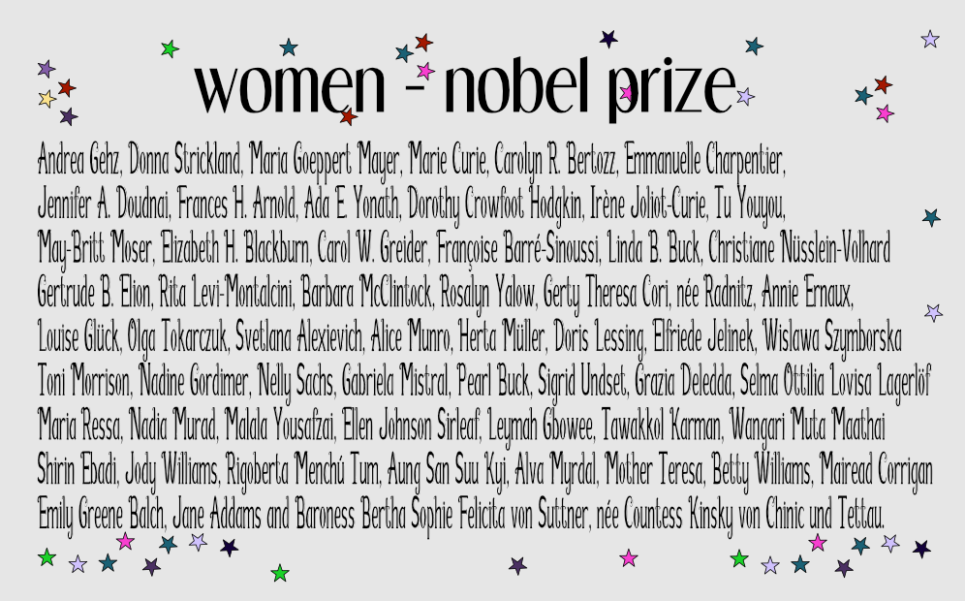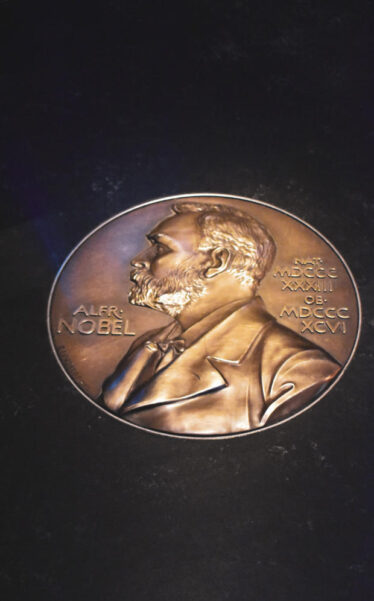Since I was a little kid, I have always heard anout the Nobel Prize. I am not sure how other remember this subject but I have always had the idea that this prize was sort of a great recognition given to a very smart, eloquent, nerdy type of person. As a matter of fact, for most of my childhood, I thought it was only meant for scientists. It is not.
The Nobel Prize and how it works
Let me begin by stating that there are in fact there are five separate prizes that, according to Alfred Nobel’s will of 1895, are awarded to “those who, during the preceding year, have conferred the greatest benefit to humankind.”

They are awarded in the following fields: Physics, Chemistry, Physiology or Medicine, Literature, and Peace. They are widely regarded as the most prestigious awards available in their respective fields.
Each year the ceremony takes place in December. Each recipient (known as a “laureate”) receives a gold medal, a diploma, and a monetary award.
A curious fact is that a prize may not be shared among more than three individuals, even though the Nobel Peace Prize can be awarded to organizations of more than three people. Although Nobel Prizes are not awarded posthumously, if a person is awarded a prize and dies before receiving it, the prize is presented.
So, different organisations award the prize in each category every year. Five of the six are chosen in Sweden, while the Nobel Peace Prize is selected in Norway.
Academics, university professors, scientists, previous winners and others all submit nominations.
A very important fact is that if nobody deserves the prize in a particular category, it is not awarded and its prize money is kept for the following year.
About Nobel
Alfred Nobel was born on 21 October 1833 in Stockholm, Sweden, into a family of engineers. Members of the Nobel family are known not only for their interest in art but also for their inventive ability, which is sometimes referred to as a Rudbeckian trait, inherited from their ancestor Olaus Rudbeck, the elder:
This family has achieved many acomplishements that hace changed the course of history. For example, Immanuel Nobel pioneered the development of underwater mines, designed some of the first steam engines to power Russian ships, installed the first central heating systems in Russian homes and was the first to develop modern plywood (cut with a rotary lathe).

One of his sons, Ludvig Nobel, was the founder of The Machine-Building Factory Ludvig Nobel, a great armaments concern and the inventor of the Nobel wheel. Ludvig was also the founder of Branobel, the foremost Russian oil industry of its time, and launched the world’s first diesel-driven tugs and tankers, besides building the first European pipeline.
But, back to the Nobel that has caught our attention in this article…in 1894, Nobel purchased the Bofors iron and steel mill, which he made into a major armaments manufacturer.
Nobel also invented ballistite, a precursor to many smokeless military explosives, especially the British smokeless powder cordite. Nobel was eventually involved in a patent infringement lawsuit over cordite.

Nobel amassed a fortune during his lifetime, with most of his wealth coming from his 355 inventions, of which dynamite is the most famous.
In 1888, when his brother Ludvig died, a French newspaper publsihed the obituary titeled Nobel “The merchant of death is dead”. Of course they got the wrong title for the worng Nobel. Any way, that really impacted him and made him apprehensive about how he would be remembered. As a result, he changed his will.
Eight years later, on 10 December 1896, Alfred Nobel died in his villa in San Remo, Italy, from a cerebral haemorrhage. He was 63 years old.
Nobel’s last will specified that his fortune be used to create a series of prizes for those who confer the “greatest benefit on mankind” in physics, chemistry, physiology or medicine, literature, and peace. Nobel bequeathed 94% of his total assets, 31 million SEK (c. US$186 million, €150 million in 2008), to establish the five Nobel Prizes. Owing to skepticism surrounding the will, it was not approved by the Storting in Norway until 26 April 1897. The executors of the will, Ragnar Sohlman and Rudolf Lilljequist, formed the Nobel Foundation to take care of the fortune and to organise the awarding of prizes.
What do the winners receive?
The recipient of each prize receives three things:
- Nobel diploma, each of which is a unique work of art
- Nobel medal, which have some differing designs
- cash prize of 10m Swedish krona (£836,000; $1.1m) – which is split between winners when there is more than one.
The laureates have spent their prize money in different things.
Marie and Pierre Curie (Marie Salomea Skłodowska–Curie was a Polish and naturalized-French physicist and chemist who conducted pioneering research on radioactivity. Her husband, Pierre Curie, was a co-winner on her first Nobel Prize, making them the first ever married couple to win the Nobel Prize and launching the Curie family legacy of five Nobel Prizes. ) used their prize to further their research.
The 2006 literature laureate Orhan Pamuk established a museum in Istanbul.
Interesting facts
The Nobel family is also represented in the Nobel Prizes Award Ceremony, held in Stockholm every year.
In 2007, the Nobel family archives kept in the Archives of Lund were inscribed in UNESCO’s Memory of the World Register.He was a chemist, engineer, and inventor.
Some interesting facts are that The Nobel Prizes, beginning in 1901, and the Nobel Memorial Prize in Economic Sciences, beginning in 1969, have been awarded 609 times to 975 people and 25 organizations. Five individuals and two organisations have received more than one Nobel Prize
Since the start, in 1901, there are some years when the Nobel Prizes have not been awarded. The total number of times are 49. Most of them during World War I (1914-1918) and II (1939-1945).
In the statutes of the Nobel Foundation it says: “If none of the works under consideration is found to be of the importance indicated in the first paragraph, the prize money shall be reserved until the following year. If, even then, the prize cannot be awarded, the amount shall be added to the Foundation’s restricted funds.”.
There have been a total of 61 Nobel Prizes and prize in economic sciences awarded to women. In 1964, Jean-Paul Sartre, was awarded the Nobel Prize in Literature. He declined the prize because he had consistently declined all official honours.

Le Duc Tho, awarded the 1973 Nobel Peace Prize jointly with US Secretary of State Henry Kissinger. They were awarded the prize for negotiating the Vietnam peace accord. Le Duc Tho said that he was not in a position to accept the Nobel Peace Prize, citing the situation in Vietnam as his reason.

It mut be noted that Four Nobel Prize laureates have been forced by authorities to decline the Nobel Prize. Adolf Hitler forbade three German Nobel Prize laureates, Richard Kuhn, Adolf Butenandt and Gerhard Domagk, from accepting the Nobel Prize. All of them could later receive the Nobel Prize diploma and medal, but not the prize amount.
Boris Pasternak, the 1958 Nobel Laureate in Literature, initially accepted the Nobel Prize but was later coerced by the authorities of the Soviet Union, his native country, to decline the Nobel Prize.
Also, three Nobel Prize laureates were under arrest at the time of the award of the Nobel Prize, all of them Nobel Peace Prize laureates: German pacifist and journalist Carl von Ossietzky, Burmese politician Aung San Suu Kyi, Chinese human rights activist Liu Xiaobo and Belarus human rights advocate Ales Bialiatski
Linus Pauling is the only person to have been awarded two unshared Nobel Prizes – the 1954 Nobel Prize in Chemistry and the 1962 Nobel Peace Prize.
Concluding
There is no other prize in the intellectual realm with the prestige of the Nobel Prizes. They also have a visibility that can hardly be compared to any other. But why are they important? What do they contribute to society? This a re very interesting and important questions.
In an age in which we are gradually losing whole sets of values, fundamentally humanistic ones, the Nobel Prizes are one of our last bastions. We seek in them a reference, not only of excellence, but of honesty, enthusiasm, commitment to ideals. Many of the winners were recognized among their peers as unique individuals, long before they were awarded such recignition.


